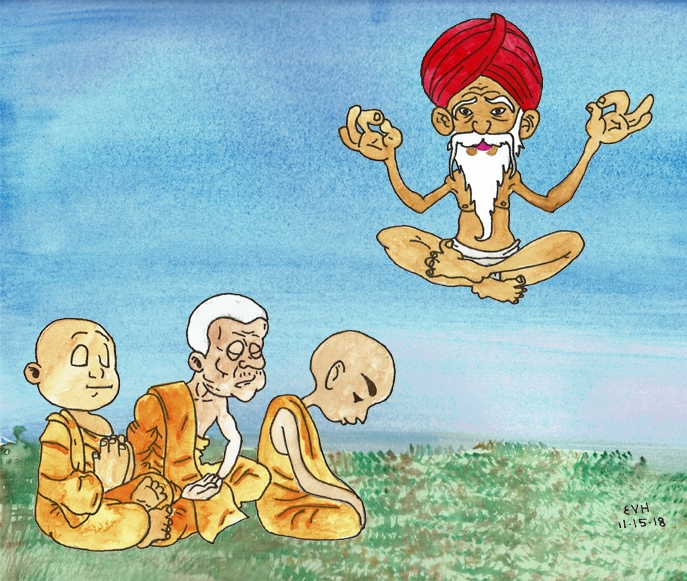
Jataka 101
Parosata Jātaka
More Than 100
as told by Eric Van Horn
originally translated by Robert Chalmers, B.A., of Oriel College, Oxford University
originally edited by Professor Edward Byles Cowell, Cambridge University
This story is identical to Jātaka 99 except in the capping verse where in this version the words “think hard” replace the words “cry out.”
“Far better than a thousand fools.” This story was told by the Master when at Jetavana. It is about the question of the unconverted.
(The incidents will be related in the Sarabhaṅga Jātaka [Jātaka 522].)
On a certain occasion the monks met in the Dharma Hall and praised the wisdom of Sāriputta, the Commander of the Dharma, who had expounded the meaning of the Buddha’s concise statement. Entering the hall, the Master asked what the monks were discussing, and they told him. “This is not the first time, monks,” he said, “that the meaning of a concise statement of mine has been explained by Sāriputta. He did so likewise in times gone by.” So saying, he told this story of the past.
Once upon a time when Brahmadatta was reigning in Benares, the Bodhisatta was born into the family of a northern brahmin. He subsequently completed his education at Takkasilā University. Abandoning sensual desire and renouncing the world for the life of a recluse, he won the Five Knowledges (the power of faith, the power of moral shame, the power of moral dread, the power of energy, and the power of wisdom) and the Eight Attainments (the eight jhānas). He lived in the Himalayas where 500 recluses gathered round him.
One rainy season, his chief disciple went with half the recluses to the domain of men to get salt and vinegar. That was the time when the Bodhisatta was about to die. His disciples, wishing to know his spiritual attainment, said to him, “What excellence have you won?”
“Won?” he said. “I have won Nothing.” (He is referring to the 7th jhāna, the base of no-thingness.) So saying, he died. He was reborn in the Brahma Realm of Radiant Devils. (For Bodhisattas, even though they may have attained to the immaterial jhānas, are never reborn in the Formless World because they are incapable of passing beyond the Realm of Form.)
(In the Buddhist Cosmology, there are four immaterial realms into which you are born if you can master the four immaterial jhānas. According to this text, however, a Bodhisatta will not be reborn into those realms.)
However, his disciples misunderstood him. They thought that he meant that he did not have any spiritual attainments. As a result, they did not pay the customary honors at his cremation.
When he returned, the chief disciple learned that the Master was dead. He asked the monks whether they had asked him about his spiritual attainments. “He said he had won nothing,” they said, “So we did not pay him the usual honors at cremation.”
“You did not understand his meaning,” the chief disciple said. “Our Master meant that he had attained insight into the Base of No-thingness.” But even though he explained this again and again to the disciples, they did not believe him.
Knowing their disbelief, the Bodhisatta cried, “Fools! They do not believe my chief disciple. I will make this thing clear to them.” And he came from the Brahma Realm and by virtue of his mighty powers rested in midair above the hermitage and uttered this stanza in praise of the wisdom of the chief disciple:
Far better than a thousand fools, though they
Think hard for a hundred years unceasingly,
Is one who, hearing, straightway understands.

Figure: Remedial Dharma Class
Thus did the Great Being - from midair - proclaim the Dharma and chastise the band of recluses. Then he passed back to the Brahma Realm, and all those hermits, too, qualified themselves for rebirth in the same Realm.
His lesson ended, the Master identified the birth by saying, “Sāriputta was the chief disciple of those days, and I was Mahā-Brahma.”
